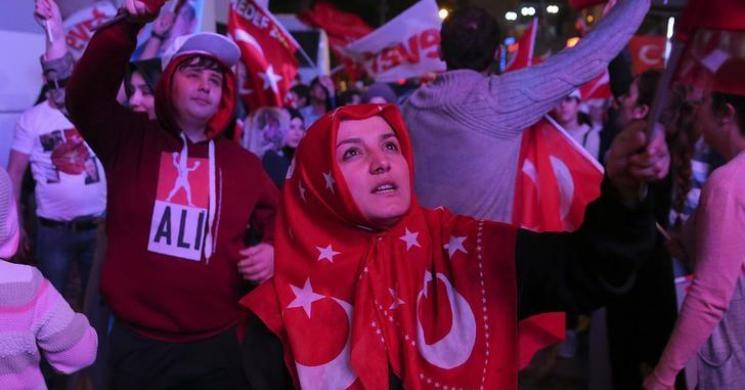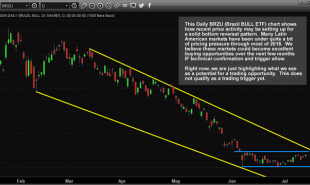
Commentary: The real winners, and losers, in the Turkish referendum
By Howard Eissenstat

Supporters of Turkish President Tayyip Erdogan celebrate in Istanbul April 16, 2017. REUTERS/Huseyin Aldemir
Sunday’s narrow win for the “yes” campaign for constitutional change in Turkey was perhaps the worst possible result for the country. Turkish democracy, always more aspiration than reality, is now in tatters. Turkish President Recep Tayyip Erdoğan won the presidential system he had desired for so long, but in doing so betrayed weaknesses that will embolden his enemies.
Neither the campaign nor the voting were free or fair. The entire campaign – and the referendum vote itself – took place under a state of emergency. Thousands of members of the opposition Democratic People’s Party (HDP) have been jailed, including most of its leadership. During the campaign, Erdoğan’s administration and supporters routinely pulled down “no” banners, disrupted opposition rallies or banned them altogether.
Some 500,000 mostly Kurdish citizens, most of whom would likely have opposed the referendum, are internally displaced; many were unable to register and the government did little to help them do so.
On Election Day, independent observers were regularly banned from polling stations. More dramatically, the country’s High Commission on Elections (YSK) allowed voting cards without an official stamp to be counted as valid votes – a decision that would have made ballot stuffing very easy. In this climate, there was almost certainly some fraud. The question of whether the fraud was broad enough to turn the results of a tightly contested referendum will probably never be answered.
The opposition is challenging the results.
For his part, Erdoğan is unlikely to either alter course or moderate his authoritarian behavior. For him, elections are a means of demonstrating his legitimacy, not testing it. He knows that the voters supported the referendum by a slim margin, but there are no indications that he will see the result as anything less than a mandate for further change. Expect no new “moderation” after Sunday’s vote.
Erdoğan’s first steps after the referendum seem aimed at underlining his brand of tough-talking populist nationalism. Speaking to supporters on Monday, he said he had been attacked by the "crusader mentality in the West," after European monitors criticized the vote.
For all of his outward show of bravado, the narrowness of the victory may have unsettled Erdoğan. While his position is strong, it is not unassailable. He remains vulnerable to another attempted coup, like the one that threatened his power in July. It is also possible that dissidents within his own Justice and Development Party (AKP) might attempt to assert themselves after the party’s weaker-than-expected showing in the referendum.
He also faces the danger of a resurgent opposition, particularly if the People’s Republican Party (CHP) and Nationalist Action Party (MHP) can work together, as they did in the Ankara municipal election of 2014, which the ruling AKP party only held by the narrowest of margins and with significant evidence of electoral fraud. A coordinated opposition under the leadership of someone like former MHP dissident Meral Akşener could make real inroads into the AKP’s monopoly on the center right and potentially remake the electoral map in important ways.
But betting against Erdoğan is a risky game. He is a master strategist and ruthless politician. Erdoğan is unlikely to reach out to his rivals; his instincts have consistently been to crush the opposition, not compromise with it. Less than 12 hours after declaring victory in the referendum, the Turkish government agreed to renew the nationwide state of emergency, first initiated after the attempted coup, for another three months.
Erdoğan will continue to use the state of emergency as a way to harass and isolate political enemies, real and perceived, trampling civil liberties along the way. Already, 47,000 people have been detained, including more than 100 journalists. Hundreds of civil society organizations have been closed, and some 120,000 civil servants sacked or suspended from their jobs. This purge will continue and expand. Anyone who might conceivably challenge Erdoğan’s power is likely to be caught in the crosshairs.
Erdoğan had promised that the referendum would bring stability, democracy and prosperity to Turkey. The truth is that the constitutional changes make all of those goals less likely. And the narrowness of Erdoğan’s victory – along with improprieties along the way – mean that Turkey’s near future is likely to be very stormy indeed.
About the Author
Howard Eissenstat is an Associate Professor of Middle East History at St. Lawrence University and a Nonresident Senior Fellow at the Project for Middle East Democracy (POMED
Read more by Soren K.Group







